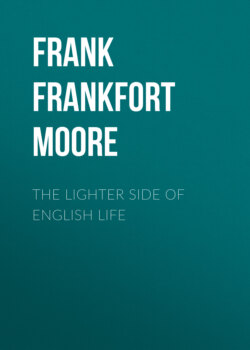Читать книгу The Lighter Side of English Life - Frank Frankfort Moore - Страница 16
На сайте Литреса книга снята с продажи.
I.—THE PILLARS OF SOCIETY
ОглавлениеTable of Contents
THURSWELL IS UNDOUBTEDLY AN IDeal English village situated in the midst of an agricultural county, and far away from the unhealthy and demoralising influences of trade. It prides itself on being “select”—so does every other English village, even when it lies deep embowered among the striking scenery of a coal-mining district. But Thurswell is really “select.” A strange family may come to one of the best houses—one of the four or five that have entrance gates with lodges and carriage drives—and yet remain absolutely ignored by the older residents. Of course the shopkeepers pay the newcomers some little attention, and the ladies who collect for the various charities and the various churches are quite polite in making early calls; but the question of calling formally and leaving cards simply because the people are newcomers, requires to be thoroughly threshed out before it is followed by any active movement on the part of the senior residents. It has been called unsocial on this account; but everybody in the world—at least, everybody in Thurswell—knows that to be called unsocial is only another way of being called select The Rector must pronounce an opinion on the strangers, and—more important still—the Rector's wife. The example of the Barnaby-Granges, who have lived for centuries at the Moated Manor House, must be observed for what it is worth. It is understood that people like the Barnaby-Granges may call upon strangers out of a sense of duty; but every one knows how far astray from the path trod by the “select” a sense of duty may lead one, so that the fact of the Manor House people having called upon the newcomer is not invariably regarded as conferring upon the latter the privilege of a passport to the most representative Society at Thurswell. The strangers must wait until Mrs. Lingard and Miss Mercer have decided whether they are to be called on or ignored. Mrs. Lingard is the widow of a captain of Sappers, and Miss Mercer is the middle-aged daughter of a previous rector, and for years these ladies have assumed the right of veto in respect of the question of calling upon newcomers. Within the past year, however, this question, it should be mentioned, has developed certain complications, owing to the strained relations existing between the two ladies. Previously they formed a sort of vigilance committee to determine what should be done, but since the breaking off of diplomatic relations between them the poor people who had previously looked to them jointly for guidance are now compelled to consult them severally as to the course they mean to pursue, and all this takes time, and the loss of time in the etiquette of first calls may be construed into actual rudeness by sensitive people.
That is how we stand at present; and although many well-meaning persons—not invariably belonging to clerical circles—have endeavoured to bring about a rapprochement for the good of the whole community between Mrs. Lingard and Miss Mercer, hitherto every effort of the kind has failed.
When the particulars of the incident that brought about the friction between the two ladies are known, it will easily be understood that a restoration of the status quo ante is not to be accomplished in a moment.
It was all due to the exceptionally dry summer. People who retain only the pleasantest recollections of that season of sunlight and balmy breezes will probably find reason to modify their views respecting it when they hear how it led to the shattering of an old friendship and, incidentally, to the complication of the most important social question that can come before such a community as is represented by Thurs-well.
